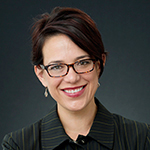By Amy Butler
 That day as I stood in front of the gathered congregation, I could feel their dismay — an almost desperate exasperation and lack of hope at the state of their community. It was my first congregational meeting as the pastor.
That day as I stood in front of the gathered congregation, I could feel their dismay — an almost desperate exasperation and lack of hope at the state of their community. It was my first congregational meeting as the pastor.
To say that I was wholly unprepared for leading congregational meetings, much less many of the other pastoral duties I’d been recently called upon to perform, may be rather an understatement. Still, as is my way, I endeavored to be as over-prepared as I could. I read up on Roberts Rules of Order; I scoured past congregational meeting minutes; I made a list of all the office volunteers to thank publicly; I looked and looked for a prayer or devotional reading that might communicate in some deep way all that my young and naïve pastor’s heart believed for this church.
Perhaps it was inexperience that led me to believe that this current state of affairs in the church was not its sad end, as so many seemed to think. Sitting in my very first history of Baptists course in college I learned the astounding idea that God’s Spirit might show up wherever she will, and that her action in the world is unpredictable. This shocking awareness was what allowed me to even consider the possibility that I might become a pastor myself, so it makes sense that as I stood up to face my congregation at that first business meeting, I just assumed that God’s Spirit was showing up, that we should just welcome this force that seems to blow in to the most unlikely places in the most unlikely ways, unhinging certainties and mixing things up, creating new possibilities we’d never considered. After all, isn’t it fundamental to our faith to understand that God’s way in the world is a way of insistent and perpetual recreation, where situations we’re sure are beyond redemption can finally find their way to hope again?
After fumbling through my report, in which I mistakenly left off the list of volunteers to publicly thank the longest-tenured and most difficult older member of the congregation, I finally got to my closing prayer. Earlier that week as I’d struggled to write a closing prayer in preparation, I soon realized I didn’t have the words I felt I needed. That week, in a frantic attempt to come up with something, I stumbled across what is commonly known as the Prayer of Oscar Romero, although it was not written and never prayed by him. The prayer speaks of taking the long view; its theme is blessing the work we do right now, in the immediacy of life, when we cannot see what the future holds, sure that the work of becoming is ever-ongoing. It proclaims the truth that the kingdom of God always lies beyond us, and that the substance of our work is found in living into a future we do not experience but believe with all our heart will come.
Those are lofty words for a novice pastor in her first congregational meeting but they named with such depth the possibility I could see in front of me.
From that lectern on that day, I’m sure I thought the task ahead was a professional task, one for which I’d prepared for years.
Since then, I’ve come to learn that the words of this prayer, words that call for becoming at every turn of this human journey, thread their way through my own life, inviting me to a rigorous engagement that relentlessly unfolds all around me.
I’ve come to believe that there is extended to each of us a perpetual invitation to live into the possibility God holds for each of our lives, and a divine insistence that we — and the world around us — can be about better things.
I think the words of this prayer are truer than I suspected, even as I read them with quavering voice at that very first congregational meeting of my first pastorate. Walking the human journey at God’s invitation plants in each of us, even in the darkest moments, an invitation to something better.
This pull, this understanding of my life and my calling as one small part of God’s grand work of redemption, has saved my life again and again. It has offered me an identity and purpose; it has invited me into holy places I never would have gone otherwise; it has given me words and meaning to ascribe to the darkest parts of my human living; it has planted the story of my life firmly within a larger narrative; it has helped me become the pastor.
